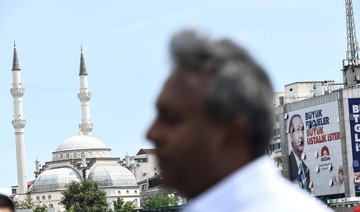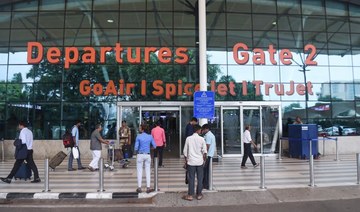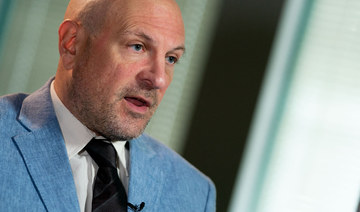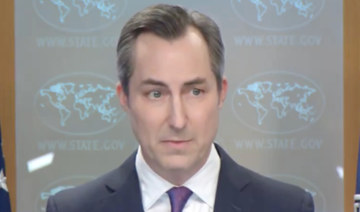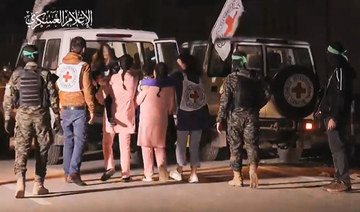ISTANBUL: Turks were voting Sunday in dual parliamentary and presidential polls seen as President Recep Tayyip Erdogan’s toughest election test, with the opposition revitalized and his popularity at risk from growing economic troubles.
Erdogan has overseen historic change in Turkey since his Islamic-rooted ruling party first came to power in 2002 after years of secular domination. But critics accuse the Turkish strongman, 64, of trampling on civil liberties and displaying autocratic behavior.
With all eyes on the transparency of the vote, polling stations opened at 0500 GMT and were due to close at 1400 GMT, with the first results expected late in the evening.
Over 56 million eligible voters are for the first time casting ballots simultaneously in the parliamentary and presidential elections, with Erdogan looking for a first round knockout and an overall majority for his ruling Justice and Development Party (AKP).
But both these goals are in doubt in the face of an energetic campaign by his rival from the secular Republican People’s Party (CHP), Muharrem Ince, who has mobilized hundreds of thousands in mega rallies, and a strong opposition alliance in the legislative polls.
“I hope for the best for our nation,” said Ince as he cast his ballot in his native port town of Yalova south of Istanbul, vowing to spend the night at the headquarters of Turkey’s election authority in Ankara to ensure a fair count.
Erdogan remains the favorite to hold on to the presidency — even if he needs a second round on July 8 — but the outcome is likely to be much tighter than he expected when calling the snap polls one-and-a-half years ahead of schedule.
Analysts say the opposition’s performance is all the more troubling for the authorities given how the campaign has been slanted in favor of Erdogan, who has dominated media airtime.
“Even if the odds are on the incumbent’s side, the race is likely to be far tighter than many expected,” said Ilke Toygur, analyst at the Elcano Royal Institute and adjunct professor at University Carlos III in Madrid.
Anthony Skinner, head of MENA at Verisk Maplecroft, added: “Ince’s wit, audacity, ability to poke holes through Erdogan’s narrative and connect with Turks beyond the traditional base of his secularist CHP has flustered Erdogan and his team.”
The stakes in this election are particularly high as the new president will be the first to enjoy enhanced powers under a new constitution agreed in an April 2017 referendum strongly backed by Erdogan.
The president had for the last two years ruled under a state of emergency imposed in the wake of the 2016 failed coup, with tens of thousands arrested in an unprecedented crackdown which cranked up tensions with the West.
Erdogan, whose mastery of political rhetoric is acknowledged even by critics, has won a dozen elections but is now fighting against the backdrop of increasing economic woes.
Inflation has zoomed well into double digits — with popular concern over sharp rises in staples like potatoes and onions — while the Turkish lira has lost some 25 percent in value against the US dollar this year.
“At each election, I come with hope. But this year I have a lot more faith, but we’ll see,” said voter Hulya Ozdemiral as she cast her ballot in Istanbul
The votes of Turkey’s Kurdish minority will be especially crucial in the parliamentary poll. If the pro-Kurdish Peoples’ Democratic Party (HDP) wins seats by polling over the 10 percent minimum threshold, the AKP will struggle to keep its overall majority.
But in a situation labelled as blatant unfairness by activists, the HDP’s presidential candidate Selahattin Demirtas has campaigned from a prison cell after his November 2016 arrest on charges of links to outlawed Kurdish militants.
After casting his ballot in his jail in the northwestern region of Edirne, Demirtas wrote on Twitter: “I wish that everyone uses their vote for the sake of the future and democracy of the country.”
The opposition has also alleged heavy bias in favor of Erdogan by state media, with news channel TRT Haber not showing a single second of Ince’s giant final Istanbul rally live.
Voting already closed last week for Turkish citizens resident abroad, with just under 1.5 million out of just over 3 million registered voters casting their ballot, a turnout of just under 49 percent.
Tens of thousands of Turkish citizens are responding to calls from the opposition to monitor the polls for a clean election and a delegation of observers from the OSCE will also be in place.
High security is in place across the country, with 38,480 police officers on duty in Istanbul alone. As is customary in Turkey on polling days, sales of alcohol in shops are also prohibited.
Turkey’s Erdogan faces resurgent opposition in twin election test
Turkey’s Erdogan faces resurgent opposition in twin election test

- Turks were voting Sunday in dual parliamentary and presidential polls seen as President Recep Tayyip Erdogan’s toughest election test, with the opposition revitalized and his popularity at risk from growing economic troubles
- With all eyes on the transparency of the vote, polling stations opened at 0500 GMT and were due to close at 1400 GMT, with the first results expected late in the evening
Israel says it is poised to move on Rafah

- Israel has killed at least 34,183 people in Gaza, mostly women and children, according to Gaza health ministry
- Defense official said Israel had bought 40,000 tents to house Palestinians relocated from Rafah in advance of assault
JERUSALEM: Israel’s military is poised to evacuate Palestinian civilians from Rafah and assault Hamas hold-outs in the southern Gaza Strip city, a senior Israeli defense official said on Wednesday, despite international warnings of humanitarian catastrophe.
A spokesperson for Prime Minister Benjamin Netanyahu’s government said Israel was “moving ahead” with a ground operation, but gave no timeline.
The defense official said Israel’s Defense Ministry had bought 40,000 tents, each with the capacity for 10 to 12 people, to house Palestinians relocated from Rafah in advance of an assault.
Video circulating online appeared to show rows of square white tents going up in Khan Younis, a city some 5 km (3 miles) from Rafah. Reuters could not verify the video but reviewed images from satellite company Maxar Technologies which showed tent camps on Khan Younis land that had been vacant weeks ago.
An Israeli government source said Netanyahu’s war cabinet planned to meet in the coming two weeks to authorize civilian evacuations, expected to take around a month.
The defense official, who requested anonymity, told Reuters that the military could go into action immediately but was awaiting a green light from Netanyahu.
Rafah, which abuts the Egyptian border, is sheltering more than a million Palestinians who fled the half-year-old Israeli offensive through the rest of Gaza, and say the prospect of fleeing yet again is terrifying.
“I have to make a decision whether to leave Rafah because my mother and I are afraid an invasion could happen suddenly and we won’t get time to escape,” said Aya, 30, who has been living temporarily in the city with her family in a school.
She said that some families recently moved to a refugee camp in coastal Al-Mawasi, but their tents caught fire when tank shells landed nearby. “Where do we go?“
Hitting hard
Israel, which launched its war to annihilate Hamas after the Islamist group’s Oct. 7 attacks on Israeli towns, says Rafah is home to four Hamas combat battalions reinforced by thousands of retreating fighters, and it must defeat them to achieve victory.
“Hamas was hit hard in the northern sector. It was also hit hard in the center of the Strip. And soon it will be hit hard in Rafah, too,” Brig.-General Itzik Cohen, commander of Israel’s 162nd Division operating in Gaza, told Kan public TV.
But Israel’s closest ally Washington has called on it to set aside plans for an assault, and says Israel can combat Hamas fighters there by other means.
“We could not support a Rafah ground operation without an appropriate, credible, executable humanitarian plan precisely because of the complications for delivery of assistance,” David Satterfield, US special envoy for Middle East humanitarian issued, told reporters on Tuesday.
“We continue discussions with Israel on what we believe are alternate ways of addressing a challenge which we recognize, which is Hamas military present in Rafah.”
Egypt says it will not allow Gazans to be pushed across the border onto its territory. Cairo had warned Israel against moving on Rafah, which “would lead to massive human massacres, losses (and) widespread destruction,” its State Information Service said.
Israel has withdrawn most of its ground troops from southern Gaza this month but kept up air strikes and conducted raids into areas its troops abandoned. Efforts by the United States, Egypt and Qatar to broker an extended ceasefire in time to head off an assault on Rafah have so far failed.
Gaza medical officials say than 34,000 people have been killed in Israel’s military campaign, with thousands more bodies feared buried under rubble.
Hamas killed 1,200 people and abducted 253 on Oct 7, according to Israeli tallies. Of those hostages, 129 remain in Gaza, Israeli officials say. More than 260 Israeli troops have been killed in ground fighting since Oct 20, the military says.
H. A. Hellyer, a senior associate fellow in international security studies at the Royal United Services Institute, said he expected the assault on Rafah “sooner rather than later” because Netanyahu is under pressure to meet his stated objectives of rescuing hostages and killing all the Hamas leaders.
“The invasion of Rafah is unavoidable because of the way he has framed all of this,” he said. But it will not be possible for everyone to leave the city, so “if he sends the military into Rafah, there are going to be a lot of casualties.”
US-led coalition in Red Sea downs Houthi anti-ship missile, four drones
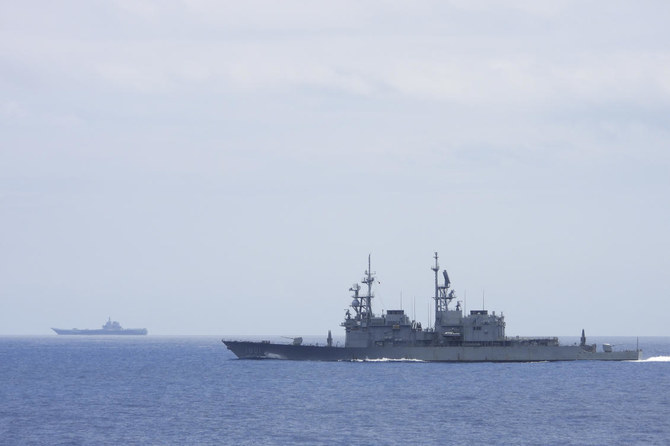
- CENTCOM: Missile was likely targeting the MV Yorktown, a US-flagged shipping vessel
- Greek frigate intercepts two drones launched toward a commercial ship
DUBAI: US-led coalition forces shot down four drones and an anti-ship missile launched by Yemen’s Houthi rebels, American authorities said Thursday, as the Iran-backed group announced strikes against US and Israeli ships.
A Greek vessel deployed in the Gulf of Aden as part of an EU naval coalition also shot down a drone off Yemen’s coast early on Thursday, the Greece general staff said in a statement.
The incidents follow a lull in attacks by the Houthis, who launched dozens of missile and drone strikes targeting shipping since November, saying they were acting in solidarity with Palestinians during the Israel-Hamas war.
Despite the drop in attacks in recent weeks, late on Wednesday the Houthis said they “are continuing to take further military actions against all hostile targets in the Red Sea, the Arabian Sea, and the Indian Ocean.”
US Central Command (CENTCOM) said in a statement on X, formerly Twitter, that just before noon Yemen time (0900 GMT) on Wednesday a coalition vessel “successfully engaged one anti-ship ballistic missile (ASBM)” launched from Houthi-controlled areas of the country.
April 24 Red Sea Update
— U.S. Central Command (@CENTCOM) April 24, 2024
At 11:51 a.m. (Sanaa time) on April 24, a coalition vessel successfully engaged one anti-ship ballistic missile (ASBM) launched from Iranian-backed Houthi terrorist-controlled areas in Yemen over the Gulf of Aden. The ASBM was likely targeting the MV… pic.twitter.com/MppinZTpTi
The missile was likely targeting the MV Yorktown, a US-flagged shipping vessel, CENTCOM said, adding there were no injuries or damage.
CENTCOM also said it had engaged and destroyed four drones launched by the Houthis shortly afterwards.
“It was determined that the ASBM and UAVs (drones) presented an imminent threat to US, coalition, and merchant vessels in the region,” CENTCOM said.
Houthi military spokesman Yahya Saree on Wednesday said that the rebels attacked US and Israeli ships, including the MV Yorktown which he claimed was hit, without providing evidence.
The Houthi rebels said they “carried out a military operation targeting the American ship (MV Yorktown) in the Gulf of Aden, with a number of suitable naval missiles, and the hit was accurate,” Saree said.
The group also “targeted an American warship destroyer in the Gulf of Aden with a number of drones, and in another operation, targeted an Israeli ship the (MSC Veracruz) in the Indian Ocean, with a number of drones,” he added, saying the operations “achieved their objectives.”
The Houthi attacks have drawn reprisal strikes from the United States and Britain as well as the deployment of Western naval forces to counter strikes on ships plying the busy commercial routes.
The Greek frigate Hydra, deployed to the Gulf of Aden in February, fired on two drones off the coast of Yemen on Thursday, shooting down one, Greek authorities said.
The Houthis, who control much of Yemen’s Red Sea coast, are part of an “axis of resistance” of Iran allies and proxies targeting Israel in protest at its war against Hamas in the Gaza Strip.
As airplane makers struggle to meet demand, Morocco wants to become a manufacturing hub

- The North African kingdom is among a list of countries vying for contracts with plane makers looking to speed up production to meet demand
- Many companies eye Morocco as a source for comparatively cheap labor and workers with an expanding pool of skilled workers
CASABLANCA, Morocco: Moroccan officials want to turn the country into an aviation hub, luring investors aiming to spread out their supply chains to more nations with available and affordable workers.
The North African kingdom is among a longer list of countries vying for contracts with big manufacturers looking to speed up production and deliver more planes to meet demand. Companies like Boeing and Airbus — as well as the manufacturers that build their components — are outsourcing design, production and maintenance to countries from Mexico to Thailand.
In Morocco, efforts to grow the country’s $2 billion-a-year aerospace industry are part of a years-long push to transform the largely agrarian economy through subsidizing manufacturers of planes, trains and automobiles. Officials hope it dovetails with efforts to grow Moroccan airlines, including the state-owned Royal Air Maroc.
“The needs are huge and we are in a very good position,” said Hamid Abbou, the airline’s CEO. “Most of the big suppliers in Europe are struggling to get people to work in this industry. We don’t have that issue.”
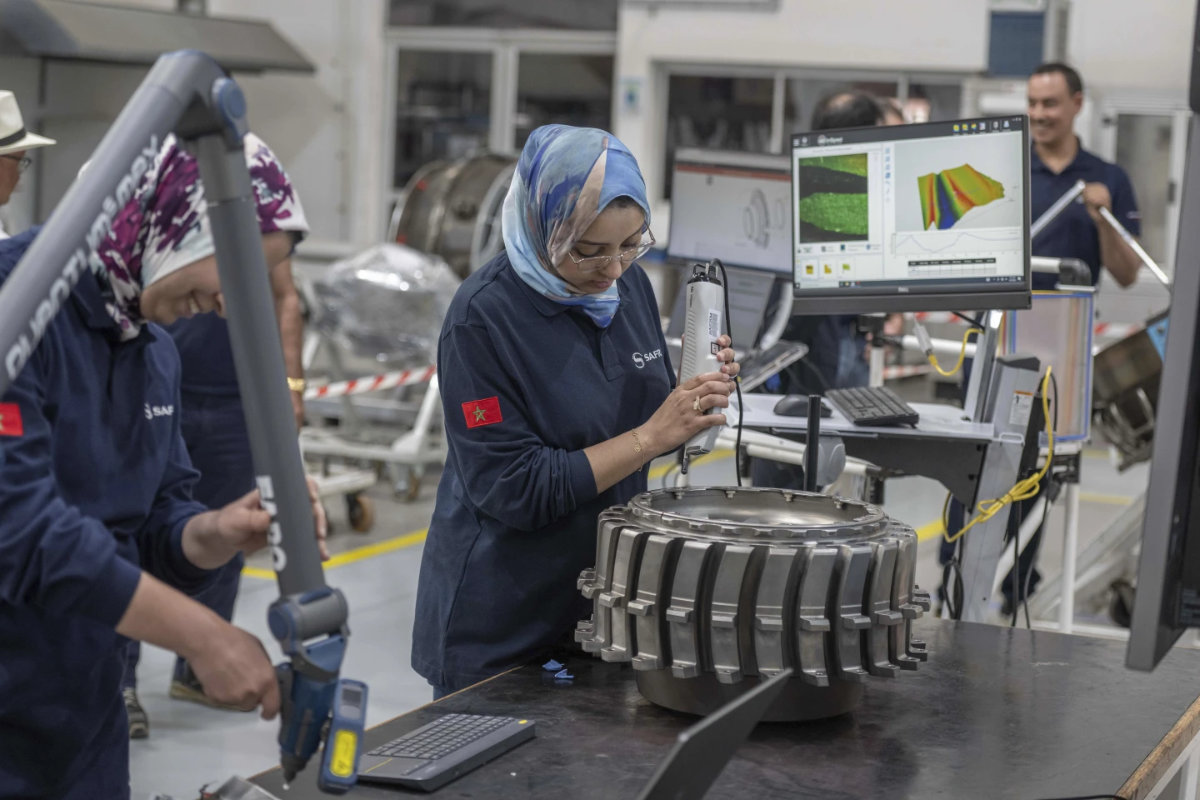
Despite hopes among its cheerleaders, the air travel industry faces headwinds. When demand rebounded after much air traffic stopped during the pandemic, manufacturers faced challenges building enough planes to meet demand from airlines. For Boeing, delays caused by supply chain issues were compounded by high-profile emergencies and deadly crashes that further curtailed deliveries.
From eastern Europe to southeast Asia, new levels of demand have forced manufacturers to seek out new locations to build and repair parts.
Safran Aircraft Engines, a French manufacturer, sends engines for Boeing 737s and Airbus 320s to a repair plant outside of Casablanca every six to eight years and then sends them back to airlines from countries including Brazil, Saudi Arabia, the United Kingdom and Ireland.
The company is among 130 in the sector active in Morocco, where parts ranging from wings to fuselages are produced in an industry that employs 42% women — a proportion that industry lobbyists say is larger than its European and North American manufacturing industry counterparts.
Though many companies eye Morocco as a source for comparatively cheap labor, the industry and government have worked to train skilled workers at IMA, an institute for aeronautics professions in Casablanca.
At an event celebrating Safran’s 25-year partnership with Royal Air Maroc, Safran CEO Jean-Paul Alary said he hoped Morocco’s aviation industry would continue to expand, particularly as industrywide demand increases and companies face labor shortages in Europe.
“It’s the access to well-qualified talent that’s been well-trained,” Alary said of Morocco. “They are the key players for achieving our goals.”
Another former US State Department official alleges Israeli military gets ‘special treatment’ on abuses
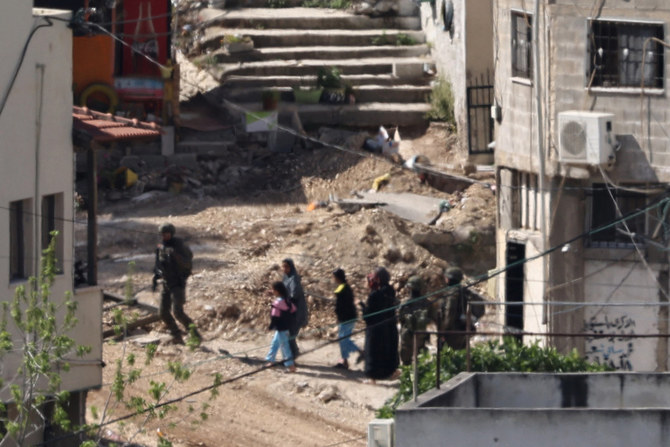
- “In my experience, Israel gets special treatment that no other country gets,” says Charles O. Blaha, former director of a State Department security and human rights office
- Late last year, Josh Paul resigned as a director overseeing arms transfers to other countries’ militaries in October in protest of the US rushing arms to Israel amid its war in Gaza
WASHINGTON: A former senior US official who until recently helped oversee human-rights compliance by foreign militaries receiving American military assistance said Wednesday that he repeatedly observed Israel receiving “special treatment” from US officials when it came to scrutiny of allegations of Israeli military abuses of Palestinian civilians.
The allegation comes as the Biden administration faces intense pressure over its ally’s treatment of Palestinian civilians during Israel’s war against Hamas in Gaza. And it matters because of who said it: Charles O. Blaha.
Before leaving the post in August, he was a director of a State Department security and human rights office closely involved in helping ensure that foreign militaries receiving American military aid follow US and international humanitarian and human rights laws.
Blaha said his departure from the State Department after decades of service was not related to the US-Israeli security relationship. He is the second senior State official involved in that relationship to assert that when it comes to Israel, the US is reluctant to enforce laws required of foreign militaries receiving American aid.
“In my experience, Israel gets special treatment that no other country gets,” Blaha said. “And there is undue deference, in many cases, given” to Israeli officials’ side of things when the US asks questions about allegations of Israeli wrongdoing against Palestinians, he added.
He spoke to reporters at an event where he and other members of an unofficial, self-formed panel of former senior US civilian and military officials released a report pointing to civilian deaths in specific airstrikes in Gaza. They said there was “compelling and credible” evidence that Israeli forces had acted illegally.
Blaha’s comments echoed those of another State Department official and panel member, Josh Paul. Paul resigned as a director overseeing arms transfers to other countries’ militaries in October in protest of the US rushing arms to Israel amid its war in Gaza.
Asked about the allegations from the two, a State Department spokesman, Vedant Patel, said “there is no double standard, and there is no special treatment.”
Israeli officials did not immediately respond to a request for comment. Israel consistently says it follows all laws in its use of US military aid, investigates allegations against its security forces and holds offenders accountable.
Israel historically is the United States’ biggest recipient of military aid, and Biden on Wednesday signed legislation for an additional $26 billion in wartime assistance. But Biden has come under growing pressure over that support as Palestinian deaths mount.
The latest Israel-Hamas war began on Oct. 7, when Hamas and Islamic Jihad, two militant groups backed by Iran, carried out a cross-border attack that killed 1,200 people in Israel. Israel responded with an offensive in Gaza that has caused widespread devastation and killed more than 34,000 people, according to local health officials.
In coming days, the administration says it will announce its official findings from reviews it did into allegations of especially serious human rights abuses by specific Israeli military units. Those units would be barred from receiving US military aid if the US review confirms those allegations.
Separately, the Biden administration also is expected to disclose by May 8 whether it has verified assurances from Israel that the country is not using US military aid in a way that violates international or human rights law. Both Israel’s written assurance and the US verification were mandated by a new presidential national security memo that Biden issued in February.
The February agreement was negotiated between the Biden administration and members of his own Democratic Party, who had been pushing for the US to begin conditioning military aid to Israel on improving treatment of Palestinian civilians.
Panel members released their report Wednesday to urge the US to scrutinize specific attacks in Gaza that the former officials argued should lead to a conclusion that Israel was wrong when it confirmed it was complying with the laws. If that determination is made, the US could then suspend military aid.
Wednesday’s unofficial report points to 17 specific strikes on apartments, refugee camps, private homes, journalists and aid workers for which the former US officials and independent experts allege there’s no evidence of the kind of military target present to justify the high civilian death tolls.
They include an Oct. 31 airstrike on a Gaza apartment building that killed 106 civilians, including 54 children. Israeli officials offered no reason for the strike, and a Human Rights Watch probe found no evidence of a military target there, the officials said. Israel has said in many of the instances that it is investigating.
Hamas releases video showing well-known Israeli-American hostage
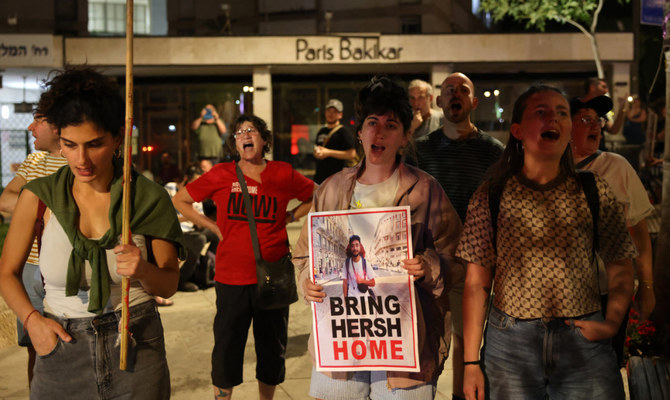
- Goldberg-Polin is one of the most recognized captives. Posters with his image are pinned up across Israel
JERUSALEM: Hamas released a hostage video on Wednesday showing a well-known Israeli-American man who was among scores of people abducted by the militants in the attack that ignited the war in Gaza.
The video was the first sign of life of Hersh Goldberg-Polin since Hamas’ Oct. 7 attack on southern Israel, and its release ignited new protests in Jerusalem calling on the government to do more to secure the captives’ release.
In the video, Goldberg-Polin accused Israel’s government of abandoning the people who are being held hostage by Hamas. He also claimed that some 70 captives have been killed in Israel’s bombing campaign. Goldberg-Polin was clearly speaking under duress, and the claim could not be independently verified. It was not clear when the video was made.
Goldberg-Polin, 23, was at the Tribe of Nova music festival when Hamas launched its attack from nearby Gaza. In the video, Goldberg-Polin is missing part of his left arm.
Witnesses said he lost it when attackers tossed grenades into a shelter where people had taken refuge. He had tied a tourniquet around it before being bundled into the truck by Hamas.
Goldberg-Polin is one of the most recognized captives. Posters with his image are pinned up across Israel. His mother, Rachel Goldberg, has met with world leaders and addressed the United Nations.
Though there was no date on the video, Goldberg-Polin appeared to reference the weeklong Jewish holiday of Passover, which began on Monday.
His parents said they were relieved to see him alive but were concerned about his health and well-being, as well as that of the other hostages.
“We are here today with a plea to all of the leaders of the parties who have been negotiating to date,” said his father, Jon Polin, naming Egypt, Israel, Qatar, the United States and Hamas.
“Be brave, lean in, seize this moment and get a deal done to reunite all of us with our loved ones and end the suffering in this region,” he said.
Hostages’ families have accused Israeli Prime Minister Benjamin Netanyahu’s government of not doing enough to secure the release of their relatives.
After the Hamas video was made public, hundreds of Israelis gathered outside Netanyahu’s official residence in central Jerusalem on Wednesday, calling on the government to strike a deal to bring home hostages. Many held posters of Goldberg-Polin, and some of the protesters set cardboard boxes on fire.
“We are afraid for his life, so we went to protest and call for the government to do whatever is possible to bring him and everybody else back, as soon as possible,” said one of the marchers, Nimrod Madrer. “Bring them back home,” the crowd chanted.
At the nearby Great Synagogue, a large crowd jeered the country’s ultranationalist national security minister, Itamar Ben-Gvir, chanting “shame” as he exited the building following a Passover gathering. One protester banged on Ben-Gvir’s car and was pushed away by police as it drove off.
Hamas and other militants abducted around 250 people in the Oct. 7 attack and killed around 1,200, mostly civilians. They are still believed to be holding around 100 hostages and the remains of some 30 others. Most of the rest were freed in November in exchange for the release of 240 Palestinians imprisoned by Israel.
Khalil Al-Hayya, a senior Hamas official, said Goldberg-Polin’s family had asked mediators to inquire about his fate for humanitarian reasons.
His family was “searching the world for any sign of him,” Al-Hayya said in an interview with Hamas-run Al-Aqsa TV broadcast on Wednesday. Hamas’ armed wing ”sent a strong message by publishing this young man’s message directed at Netanyahu,” Al-Hayya said.
The US, Qatar and Egypt have spent months trying to broker another ceasefire and hostage release, but the talks appear to have stalled. Hamas has said it will not release the remaining hostages unless Israel ends the war, which has killed over 34,000 Palestinians, according to local officials.
Netanyahu has rejected those demands, and says Israel remains committed to destroying Hamas and bringing all the hostages home. He has come under mounting criticism in Israel, where some say it will be impossible to do both.



